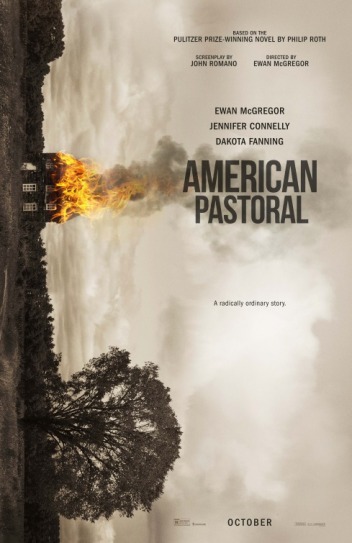American Pastoral (Ewan McGregor, 2016)
Actor Ewan McGregor (Miles Ahead) makes his directorial debut with American Pastoral, an extremely faithful, if also inert, adaptation of author Philip Roth’s 1998 Pulitzer Prize-winning novel of the same name. Working off a script by John Roman (The Lincoln Lawyer), McGregor hits all the same beats as did Roth, yet ends up with a listless, dispiriting and distinctly uncinematic yarn. I was no great fan of the original work, despite its accolades (though I love other books by Roth), but it was a novel of great scope, in which Roth used the trials and tribulations of one American family to discuss the festering rot at the heart of the American Dream. I appreciated Roth’s ambition, if not his execution. Sadly, in McGregor’s version, that ambition has been reduced to a story of a small-town Job, shorn of much of its socio-political relevance. All the same plot details are there, but the emotional emphasis falls too squarely on the family drama, making this just an unpleasant tale of domestic dysfunction.
McGregor, himself, plays Seymour “Swede” Levov, scion of a successful glove manufacturer and a young man for whom life has always gone swimmingly, despite his status as a Jew in 1940s America (if you wonder how the Scottish McGregor fits in the role, the Swede is written as looking distinctly un-Jewish). A glorious high school athlete and easygoing man, the Swede seems bound for greatness, a destiny confirmed when he marries Dawn (Jennifer Connelly, Noah) a local shiksa beauty queen. Surely their children will be beautiful, and since the Swede is set to take over his father’s business, their financial future is secure, as well. Our take on the story is colored by narrator Nathan Zuckerman – Roth’s literary alias and a recurring character in his œuvre – whom we meet before ever laying eyes on the Swede. Played by David Strathairn (Good Night, and Good Luck.), he wanders in to his 45th high-school reunion where he encounters his erstwhile best friend, the Swede’s younger brother, in town for that sibling’s funeral. For the early part of the film, before Zuckerman’s voice is abandoned until the end, we cut back and forth between the Swede and Zuckerman, the latter our guide through the former’s ups and downs.
For things do not go as planned for the Swede. He and Dawn have a lovely daughter, yes, but over time she grows into a troubled teen who comes of age as the tumult of the 1960s erupts into violence. Alienated and adrift, she flees the comforts of home and tears the heart out of her parents in the process. In both book and film, this daughter, Merry (Dakota Fanning, The Benefactor) is more construct than real, a device through which Roth and McGregor attempt to explore the volatile forces that simmer just beneath the surface of polite society. Unfortunately, in the film, she remains a cipher, only now the script requires us to invest in the emotional fabric of her relationship with her father. She’s too one-dimensional for that to work, and so the film plays like a feeble melodrama. We know we should feel sad, but nothing resonates. This in spite of the fact that many bad things happen to good people.
It’s too bad, since McGregor, Connelly and Fanning are all compelling performers (Strathairn, as well, but he’s not given much to do here) and have some fine moments, together and separately. Peter Riegert (At Middleton), as the Swede’s father, is watchable, as always, and provides much-needed comic relief in this otherwise ceaselessly dreary affair. Certainly, individual scenes work well, and McGregor and cinematographer Martin Ruhe (Run All Night) succeed in evoking the bucolic beauty of the New Jersey countryside, from which springs Merry’s inchoate venom. But it all adds up to very little, other than a set of plodding nostalgic set pieces, slavishly recreated verbatim from the book, devoid of meaning beyond their own internal self-contained logic. I’m not sure that Roth’s book could have made a good movie even in more accomplished hands, but this particular adaptation highlights all of the original’s structural weaknesses and none of its strengths, failing to make a case for its own raison d’être. If wallowing in existential ennui, for the sake of it, is one’s thing, then the film might have some appeal. Otherwise, wait for McGregor’s sophomore effort, should he be afforded one.

